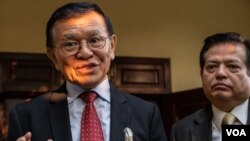The council of judges on Wednesday afternoon proceeded to question Kem Sokha about his stated adherence to nonviolence and attempted to impeach his character by associating him with the “violent policies” of exiled opposition leader Sam Rainsy.
The council of judges’ line of questioning was similar to the prosecution’s assertion a few weeks ago that Kem Sokha’s repeated claims – in old speeches and stated political policies – that he only followed nonviolent strategies was moot because he associated with Sam Rainsy to form the Cambodia National Rescue Party.
Judge Seng Leang, one of the three judges in the case, questioned Kem Sokha for around 45 minutes over his decision to merge the Human Rights Party with the Sam Rainsy Party in 2012 to form the CNRP.
Seng Leang asked Kem Sokha about his decision to join the exiled opposition leader, who was frequently called a “violent person” in court, based solely on video clips of speeches played in court, where he was seen talking about wanting to change and overthrow the government.
“Why did you merge with Sam Rainsy who is accused [of crimes] and a prisoner of the country” Seng Leang said.
“Why didn’t you merge with someone who was more clean?” he asked.
Seng Leang continued this line of questioning, even though Kem Sokha admitted that there were occasions when he didn’t completely agree with what Sam Rainsy said publicly, but would have stopped working with the exiled opposition leader if he had acted violently.
However, Seng Leang did not let up, continuing to question Kem Sokha about his merger with Sam Rainsy.
“When there are two leaders, one who supports violence and the other who does not, how do you work together?” Seng Leang asked.
“Did you convince Sam Rainsy to comply with nonviolent policies or did he convince you to comply with violent policies? His standpoint was based on violence.”
It was unclear why Judge Sang Leang chose to engage in this line of questioning or how it was related to the elements of the alleged crime of treason. Article 443 of the Criminal Code relating to “Conspiracy with foreign power” requires a “secret agreement with a foreign state or its agent with a view of fomenting hostilities or acts of aggression against the Kingdom of Cambodia.”
Seang Leang also asked Kem Sokha if there was any foreign assistance to form the CNRP in 2012, to draft the joint statement announcing the merger, and if the party’s internal policies were drafted with international assistance.
At one point, Seng Leang even implied that it was not “technically” possible to merge Human Rights Party and Sam Rainsy Party after only a two-day meeting in Manilla, Philippines, questioning if there was assistance before Kem Sokha and Sam Rainsy met.
“It seems like a very fast and quick meeting,” he said. “Are you sure this joint statement was drafted in Manilla? Was there any foreigner in the meeting?”
Kem Sokha repeatedly rejected receiving any foreign assistance during the formation or following the establishment of the CNRP, insisting that there was an abundance of international and domestic advice given to him over the years, but that he acted of his own volition.
The opposition leader did say that international groups, such as Konrad Adenauer Stiftung, had helped, through their trainings and workshops, to hone the party’s internal policies, but again repeated that such groups were not involved in the formation of the CNRP. He added that all political parties had received similar assistance.
Towards the end of the hearing, prosecutor Vong Bun Visoth picked up Seng Leang’s line of questioning, asking Kem Sokha if he regretted joining Sam Rainsy to form the CNRP.
“Now after knowing that he is violent, do you have any regrets?” Bun Visoth asked.
“Then why did Samdech Hun Sen pardon him if he knew [Sam Rainsy was violent],” said Kem Sokha, referring to a royal pardon given to Sam Rainsy prior to the 2013 elections.
The trial will continue on Thursday with the court possibly looking at Kem Sokha’s activities during the 2013 general election.







